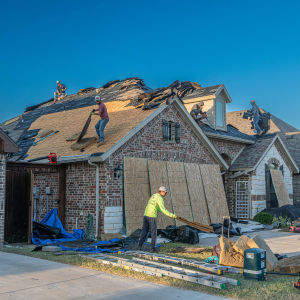
Is The Seller Responsible For Any Repairs After Closing In Fort Worth, TX?
After months of house hunting and back-and-forth negotiations, you think you’ve finally found a home that ticks all the boxes. However, after a closer look, you notice a few issues that need attention. You hesitate. Just before sitting down at the closing table, an important question comes to mind: Who is responsible for fixing these issues? And if it ends up being me, will I be okay with that?
Understanding who is responsible for repairs after closing is one of the finer details in the home-buying process that many buyers and sellers overlook, especially if the property isn’t newly renovated. The responsibility for necessary repairs often depends on the timing, the nature of the issue, and the specific terms agreed upon in the contract.
Let’s break down what you need to know about post-closing repair responsibilities in Fort Worth, TX.
Buyer vs. Seller: What are Their Responsibilities?
To fully understand who handles repairs during and after a home sale, it’s important to look at what both the buyer and seller are responsible for and what each is legally required to do throughout the process.
What Is The Seller’s Role?
The seller’s main responsibility is to remain honest and transparent throughout the entire transaction. In fact, sellers aren’t legally required to make repairs. Still, many choose to do so to fetch a higher asking price, make their home more attractive to buyers, and stand out in the market.
Some sellers choose to list their homes as-is, meaning they are not willing to make repairs or adjustments based on the buyer’s requests. However, even in an as-is sale, Texas law still requires sellers to maintain honesty and complete the Seller’s Disclosure Notice.

This form is one of the seller’s essential legal obligations. It must be filled out accurately and in good faith, detailing:
- Any known defects or issues with the property (such as foundation problems, leaks, or electrical issues )
- Past repairs or upgrades that have been completed
- Any other material facts that could affect the property’s value or condition
By providing this disclosure, the seller ensures transparency and protects themselves from potential legal disputes down the road.
In short, the seller’s main responsibilities include:
- Providing an honest and complete Seller’s Disclosure Notice
- Completing any repairs or concessions agreed upon in the purchase contract
- Maintaining records or receipts for past repairs or renovation (such as HVAC servicing, roof work, or asbestos removal)
- Ensuring all required documentation is available for the buyer’s review
What is the Buyer’s Role?
While it may seem like the seller carries most of the responsibility, buyers have just as important a role in the process. The buyer is responsible for doing their due diligence by thoroughly reviewing all documentation and ensuring they’re satisfied with the property’s condition before closing.
This includes reviewing documents such as:
- The Seller’s Disclosure Notice
- Inspection Reports
- Warranties and insurance documents
- Title reports to verify that there are no liens or ownership issues
If the disclosure form or inspection reveals any problems (for example, plumbing or roofing issues), it’s up to the buyer to negotiate how it will be handled. This could mean requesting that the seller make repairs, asking for a price reduction, or seeking repair credits at closing.
In short, the buyer’s main responsibilities are:
- Reviewing all documents and disclosures carefully
- Ensuring the property’s condition and title are acceptable
- Negotiating any necessary repairs, credits, or price adjustments
- Consulting with their real estate agent and an inspector to make informed decisions
When both parties understand and fulfill their responsibilities during the sale, it helps avoid confusion and disputes after closing. Most repair issues are resolved during negotiations and inspections, but if something falls through the cracks, the details of the purchase agreement will determine who’s accountable.
Clear communication, honest disclosure, and careful review on both sides are essential to avoid causing surprises once the property has officially been transferred.
You can sell your Texas home as-is for cash and skip the stress of repairs and negotiations. House Buying Girls can help you secure a fast, hassle-free sale and get the cash you need quickly.
Understanding Repair Responsibilities After Closing in Fort Worth
If you’re reading this after already completing the closing process, with papers signed and keys in hand, you may find yourself in a tough spot. In most cases, once ownership transfers and the property is officially yours, the responsibility for any repairs falls on you, the new homeowner.
That said, who’s responsible for repairs after closing ultimately depends on what was outlined and agreed upon in the purchase agreement.
For example, if the contract clearly states that the seller will handle a specific repair, such as replacing broken kitchen tiles, even after the sale, then that particular repair remains the seller’s responsibility. However, only the repairs explicitly mentioned in the agreement are covered, and any new issues discovered after closing will generally be the buyer’s responsibility.
If no discussions or written agreements were made regarding repairs, it’s assumed that the buyer performed due diligence and accepted the property as-is at the time of purchase.
There is one key exemption: non-disclosure of known issues. If the seller was aware of a defect but intentionally failed to disclose it, they can still be held legally accountable for fraud even after closing.
In most situations, once the sale is finalized, it’s too late to negotiate repair responsibilities. That’s why it’s essential to address these matters during the negotiation and inspection period, before the property officially changes hands.
Avoid the hassle of repairs after closing by selling your home as-is for cash. Contact House Buying Girls to get a fast and stress-free sale.
When is the Seller responsible for post-sale repairs?
While repair duties are generally transferred to the buyer after closing, there are situations where the seller can still be held responsible. So, buyers, you can all breathe a sigh of relief knowing that not all discovered damages post-closing are your responsibilities.
1. Repairs Stated in the Contract
If the purchase agreement clearly specifies that the seller must complete certain repairs after closing, such as fixing a roof leak or replacing damaged flooring, they remain legally obligated to do so. This ensures that buyers receive the property in the agreed-upon condition and that the negotiated repairs are honored. In cases where the seller rescinds on the contracted repairs, you have legal recourse to go after them.

2. Failure To Disclose Known Defects
Texas law requires sellers to complete the Seller’s Disclosure Notice accurately and honestly. If a seller conceals a significant defect, such as a foundation problem or plumbing issue, they may face legal liability and be required to pay for repairs. This rule protects buyers from hidden issues that could significantly affect the property’s value or safety.
3. Misrepresented or Incomplete Repairs
If the seller claims certain repairs were made, but they were done poorly or not at all, they can still be held accountable for those costs. Buyers should always look for and keep detailed documentation and inspection reports that can help support such claims.
While buyers usually assume repair responsibilities after closing, sellers remain accountable for issues tied to dishonesty, misrepresentation, or unfulfilled contractual promises.
How Long Are Sellers Liable After Closing In Fort Worth, Texas?
When you sell a home in Fort Worth, Texas, your legal responsibility for that property doesn’t end the moment the sale closes. In certain situations, a buyer can still hold you liable–but only within a specific time frame and under particular circumstances.
Texas law generally allows buyers to bring a claim against a seller within four years from the date of the sale if they believe there was fraud, misrepresentation, or failure to disclose known defects. This means that if a major issue comes to light, for example, hidden foundation damage, water leaks, or pest infestation, and the buyer can prove that the seller knew about the problem but did not disclose it, they may have grounds to take legal action.
However, this doesn’t mean a seller is on the hook indefinitely. Over time, due to normal wear and tear arising from use, new damage may occur long after the sale, which may make it difficult to hold the previous owner responsible. After several years, courts typically view these issues as the new owner’s responsibility, not the seller’s.
If a buyer suspects a hidden defect, it is important that they act quickly, since the longer they wait, the harder it becomes to prove that the issues existed before the sale, and that the seller intentionally failed to disclose it.
Likewise, for sellers, it’s crucial to be completely transparent in the property disclosure notice and provide any inspection reports or known repair history upfront. This helps protect sellers from potential claims down the road.
Can A Buyer Back Out After Closing?
If the property turns out to be different from what you expected, perhaps with hidden repairs or undisclosed issues, you might be wondering if there’s a way to walk away from the deal. Unfortunately, once the closing is complete and everything has been signed, the transaction is legally finalized, and ownership has officially transferred. At that point, backing out isn’t simple or typically possible.
The only circumstances where you might have legal grounds to undo the purchase are if the seller breached the contract through fraud, misrepresentation, or concealing knowledge of major defects. In those cases, you have a legal leg to stand on when challenging the sale.
That said, these are complex situations, where each state has its own real estate laws and disclosure requirements, and proving fraud or misrepresentation can be difficult. Often, these matters must be resolved through legal proceedings or settlement negotiations.
If you find yourself in this position, your best step is to consult a qualified real estate attorney, who can help you understand your rights, gather evidence, and determine whether you have a valid claim to reverse or recover losses from the transaction.
Make selling simple and stress-free. Sell your Fort Worth house faster and in other cities in Texas without worrying about repairs or delays.
What Buyers And Sellers Should Know Before Closing in Fort Worth, TX
1. Read The Contracts And Forms Carefully
Before closing, both buyers and sellers should take the time to thoroughly review the purchase agreement and all related documents. These contracts outline each party’s rights and responsibilities, from payment terms and deadlines to repair obligations and disclosures. Understanding them inside and out can make the difference between a smooth transaction and a costly mistake.
Buyers should pay close attention to the seller’s disclosure forms, which list known issues with the property, past or present. If a problem was repaired, ask for receipts or inspection reports to confirm that the work was done properly.
Sellers should be honest and transparent about any known issues to avoid legal trouble after the sale.
Even if a property seems like a great deal, don’t rush to sign. Take time to read every clause, ask questions, and make sure both sides agree to fair and clear terms before closing.
2. Call for a Home Inspection Before Closing

It’s always a smart move for buyers to schedule their own inspection before closing. An inspection helps verify that the property’s condition matches what’s stated in the seller’s disclosure and ensures that the home is safe and up to code. While it does add to your upfront costs, it’s money well spent for the peace of mind that comes with knowing exactly what you’re buying.
A professional home inspection can uncover hidden issues that may not be visible during a casual walkthrough. Discovering these problems early gives you the leverage to renegotiate the price, request repairs, or even walk away if the issue is serious enough.
This step is especially important for properties or homes where the seller didn’t arrange an inspection prior to listing. Just keep in mind, sellers aren’t legally obligated to make fixes unless agreed upon in the contract.
3. Negotiate Like a Pro
The negotiation stage is where strategy really matters. Both buyers and sellers should come prepared with clear goals, priorities, and limits. For buyers, focus on specific actionable requests rather than general complaints. For example, asking for repair credits, a lower purchase price, or funds held in escrow until repairs.
Sellers should also know their bottom line. Address reasonable requests to keep the deal moving, but stand firm on points that are essential. Understanding market conditions, whether it favors buyers or sellers, can give you leverage and help guide your decisions.
Successful negotiation is less about “winning” and more about finding a fair compromise that satisfies both parties. Be professional, clear, and organize and document all agreements in writing to ensure there are no misunderstandings before closing.
Skip the complications of traditional sales and get cash for your home. We buy houses in Dallas and other cities in Texas and can close on your schedule.
Final Thoughts: Is the Seller Responsible for Any Repairs After Closing in Fort Worth, Texas?
Buying or selling a home in Fort Worth, TX, involves more than just a great sale price. Understanding repair responsibilities, disclosure requirements, and negotiation strategies can save both buyers and sellers from costly surprises after closing.
Remember, once closing is complete, most responsibilities fall on the buyer, unless the contract specifically states otherwise, or there was fraud or misrepresentation. Careful planning during the buying and selling process is the best way to avoid disputes and ensure a smooth transaction for everyone involved.
Need to sell fast and for cash?
We’re the House Buying Girls, and we buy houses as-is for a fair and competitive price! Our goal is to make selling your home simple, fast, and stress-free. When you sell, you don’t have to worry about your parents; we handle everything. Even better, we cover the closing cost, so you get a hassle-free experience from start to finish.
Reach out today by calling (214) 393-8026 or filling out the short form below. We’d love to hear from you and help you move forward quickly with your home sale!
Helpful Fort Worth Blog Articles
- How Long To Live In A House Before Selling In Fort Worth, TX
- How To Sell A House In Bankruptcy In Fort Worth, TX
- Is The Seller Responsible For Any Repairs After Closing In Fort Worth, TX?
- Selling Home with Reverse Mortgage in Fort Worth, TX
- Appraisal Required Repairs in Fort Worth, TX
- Understanding Taxes When Selling an Inherited House in Fort Worth, TX
- Fort Worth, TX Neighborhood Map
- Fun Facts About Fort Worth, Texas

